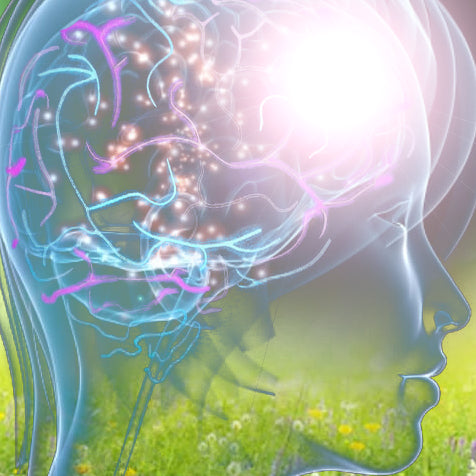
About 15 years ago, I suffered from severe anxiety, migraines and at times depression. Around the same time I had persistent painful digestive issues. They didn't happen entirely together, but I always felt that they were related. This was long before there was any real research on the connections between the brain and gut.
I set out to heal my gut with real foods, raw milk and kefir. Overtime, it did help and the more it helped, the less anxiety I felt. I also worked on lowering my daily stress, practicing mindfulness, incorporating purpose, gratitude and service to others. That helped too. And interestingly enough when I practiced mindfulness, gratitude, etc, my digestive issues also lessened. So by healing the gut, I helped heal my brain and when I healed my brain, my gut healed. It was always reciprocal.
The Gut Brain Axis
There is plenty of research today that points to what I suspected years ago - that the brain and gut and intricately connected.
The human gut has over 100 million nerve cells. It’s no wonder that its called the 2nd brain. The amount of communication between the gut and the brain is astounding. Its goes way beyond hormonal signals of “I’m hungry”or "I’m full”. The microbiome uses the vagus nerve to directly talk to the brain. Leading researchers like Dr. Gundry believe the microbiome may be the true brain in the human body as it controls and dictates so much of who we are and how we feel.
The connection between the gut and the brain is so strong that problems in the brain almost always correlate to problems in the gut or vise versa. That’s why healing the gut is so important to healing the brain as they are both connected.
Serotonin and Dopamine
Most people have heard of serotonin and dopamine, but what most people don't know is that around 90% of serotonin and 50% of dopamine is made in the digestive tract.
Most people know that the serotonin neurotransmitter is associated with mood and if you don’t have enough serotonin, then you may become sad or depressed. Prozac and many other anti-depressants work by stopping the re-uptake of serotonin which is suppose to allow easier access to it.
It’s estimated that roughly 90% of the body’s serotonin level is made in the gut and not in the brain. That’s crazy when you think about it. Our happiness is largely dictated by our microbiome and the bacteria in our gut. It’s no wonder we feel like crap when we eat crap.
It’s estimated that 50% of dopamine is made in the gut. Dopamine is the feel good neurotransmitter. The good feelings associated with dopamine reinforces behavior. Parkinson's, schizophrenia and Alzheimer's are all associated with abnormal levels of dopamine.
Fecal Transplants
There’s a fascinating study on fecal transplants. Fecal transplants are growing in popularity and basically its just transferring fecal matter from one healthy person to another in order to rebalance the microbiome. There are reports that if the donor has depression, that can be transferred to the new person receiving the fecal matter. To be able to transfer depression to another simply by transferring what’s in the gut just goes to show how important the microbiome really is.
Anxiety
In a study with rats, kefir helped minimize the anxiety associated with nicotine withdrawal. Rats were fed nicotine for 17 days than were fed kefir or anti-depressants for 7 days to see if it helps with cognition and anxiety associated with the withdrawal. All tests indicated that kefir (made with cows milk or soy milk) had significantly lowered anxiety and improved cognition.
One interesting part of this study showed that kefir made the rats much more adventurous than the rats on anti-depressants. One of tests involved rats that had the option to explore an open and well lit area. Scared or anxious rats would stay by the walls while the more adventurous would explore the center. The anti-depressants helped the rats, but only slightly. However the kefir greatly improved the rats desire to explore that scary unknown.
Social Anxiety
An interesting study on social anxiety showed a correlation between the consumption of fermented foods and lower social anxiety. It was a huge study of 710 people. They found that exercise, neuroticism and fermented foods all predicted social anxiety independently. It makes sense that more exercise or less neuroticism (less moodiness) means less social anxiety. But its interesting to see that the consumption of fermented foods also correlated to less social anxiety. It also showed that those high in neuroticism showed a significant decrease in social anxiety due to the consumption of fermented foods. Basically it means that consuming fermented foods like kefir may help lower social anxiety for those who are prone to it (by way of neuroticism).
Depression
One study showed that 4 weeks of consuming a multi-species probiotic (lactobacillus and bifidobacteria) was enough to lower rumination (thinking the same thought) and aggressive thoughts that may lead to sadness or depression. It was an impressive triple blind placebo test consisting of 20 people that had all the controls in place to ensure its validity. Even though it was a probiotic, the multi-species probiotic did share strains similar to kefir.
One large review looked at all the randomized trials of probiotics and depression and found, overall, that probiotics significantly decreased depression symptoms in both healthy people and those suffering from depression. The only category it did not have any significant effect was those over 65 years of age. Even though they did not specifically test kefir, kefir is a probiotic powerhouse with more CFU and strains than probiotic pills. The results should hold true with kefir consumption.
Bottom Line
Kefir comes from the Turkish word “keif” which means feel good. For hundreds of years, people have known that consuming kefir makes you feel good. A simple google search will show the vast amount of people who simply feel good after drinking kefir. The connection between the gut and the brain is incredibly strong. Something so good for your gut means that its good for your brain too. The research now supports that notion too. The new research shows how kefir and probiotics can lower anxiety and depression.
Do you feel good after drinking kefir? Has it helped lower your anxiety or depression?


Comments
Anna Liza Acosta Agpalsa
I drink the bio max 1% kefir indeed makes me feel good it makes me feel relax, plus im a fan of plain yogurt, clearing up my stomach issues and it’s beneficial to my gut health. All over it’s amazing))
September 22, 2022
Anna Liza Acosta Agpalsa
I drink the bio max 1% kefir indeed makes me feel good it makes me feel relax, plus im a fan of plain yogurt, clearing up my stomach issues and it’s beneficial to my gut health. All over it’s amazing))
July 30, 2022
Helga Smith
My Daughter introduced me to Kefir and I make it for myself when I need it and the Cultures come from Yemoos it has helped my Intestines a lot I had colon cancer and a Tumor removed 12 Years ago and I was having a lot of Problems after that so thanks for Kefir I feel a lot better
September 16, 2019
Leave a comment